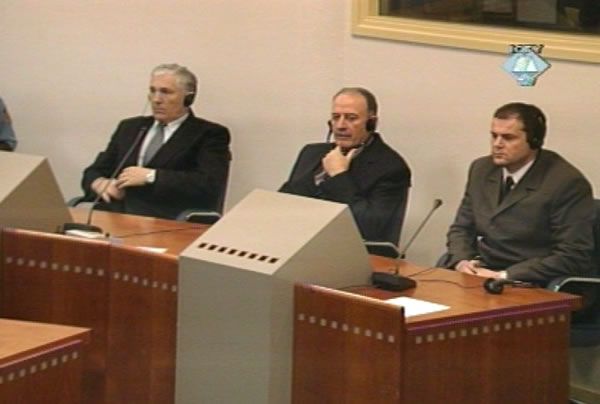Home
BATTLE FOR VUKOVAR
At the hearing on the prosecutors’ application to refer the “Vukovar Three” case to the judiciary of Croatia or Serbia and Montenegro possible advantages and flaws of trials in Belgrade and Zagreb were discussed. How to establish balance between the victims’ interests and the rights of the accused?
 "Vukovar three" in the courtroom
"Vukovar three" in the courtroom A Referral Chamber of the Tribunal, which decides on the motions to refer the cases to national courts, witnessed a “battle for Vukovar” at today’s hearing. Its outcome will decide whether the three former JNA officers, who have been charged with the massacre of prisoners of war at Ovcara, are to be tried in Belgrade, Zagreb or The Hague, after all.
The Prosecutor’s Office, which submitted the application for the referral of the case, believes that there are “balanced arguments” in favor of either venue. The advantage of the trial being held in Zagreb lies in the fact that the crimes, for which Mile Mrksic, Miroslav Radic and Veselin Sljivancanin have been indicted, were committed on the Croatian territory, so “justice might be closer to the victims”. On the other hand, Belgrade might be favored as a venue due to the fact that those who are directly responsible for the Ovcara killings are currently being tried there, and that the three accused are Serbia and Montenegro citizens.
At today’s hearing, government representatives of both Serbia and Montenegro and Croatia exchanged legal and other arguments, seeking to convince the Chamber that the case should be ceded to their side. Rasim Ljajic and Vladimir Djeric, who represented Serbia and Montenegro, enjoyed strong support of the defense counsel who were trying hard to get the case referred to Belgrade, despite the fact that the sentence their clients might get, if found guilty, would be twice as long under the local legislation: 40 years’ imprisonment, compared to 20 if they are sentenced in Zagreb.
Representatives of Serbia and Montenegro and the defense team discussed possible flaws and “negative consequences” of a trial in Zagreb to a greater extent than they discussed the advantages of a trial in Belgrade. The referral of the case to Croatia, according to Ljajic, would “bolster public resistance toward cooperation with the Tribunal.” Djeric expressed his reservations about the very prospect of a “fair trial” in Zagreb, pointing to a recent OSCE report which mentions the “ethnic bias” of Croatian courts. According to the defense counsel, the case’s referral to Croatia would represent a “two-stage extradition, with the Tribunal taking the part of a mediator”. They also raised concerns about the reluctance of defense witnesses to travel to Croatia for fear of “sealed indictments”, and the influence that the executive power, whose representatives had already made public statements about their wish to try and sentence the “Vukovar Three” in Zagreb, may have over the court.
The Croatian representative Zeljko Horvatic limited his argument mostly to legal issues, first of all the “territorial principle” which, he believes, is universally accepted in international law. According to Horvatic, it is a “well-known fact that the country on whose territory a crime has been committed takes absolute precedence” over others in trying the perpetrators of a crime.
In concluding the hearing, Judge Alphons Orie presented the dilemma faced by the Referral Chamber. On the one hand, if the case should be referred to the country that the accused come from, the victims and their families may fear that the interests of the accused will be put before those of the victims. On the other hand, should they be tried in the country of the victims, the accused may fear that the court will put too much weight on the interests of the victims without adequately protecting the rights of the accused.
Unless a magic formula can be found to establish the balance between the interests of the victims and the rights of the accused, the judges may well decide to try the “Vukovar Three” in The Hague, after all.
Linked Reports
- Case : Mrksic et al. - "Vukovar Hospital"
- 2005-02-09 WILL THE VUKOVAR TRIAL BE HELD IN ZAGREB OR IN BELGRADE?
- 2005-02-04 VUKOVAR THREE CASE TO BE DEFERRED TO CROATIA?
- 2004-10-07 OVCARA TRIAL TO BEGIN IN FIRST HALF OF 2005
- 2005-06-09 THE “VUKOVAR THREE” TO BE TRIED IN THE HAGUE
- 2005-07-01 'THE VUKOVAR THREE" REMAIN IN THE HAGUE
- 2005-09-07 “VUKOVAR THREE” SEEK A POSTPONEMENT
